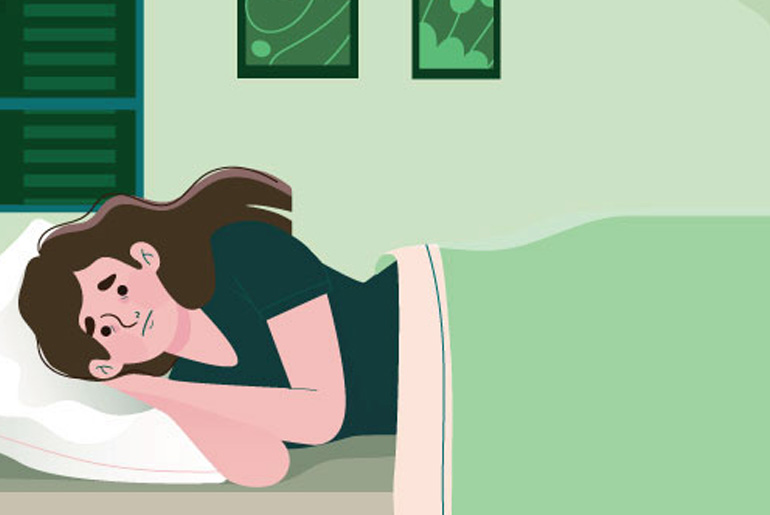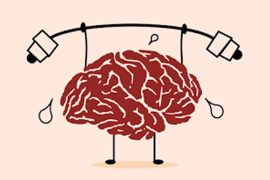A racing mind at bedtime is a common issue, especially among individuals with insomnia. Unlike rumination, which focuses on repetitive negative thinking, racing thoughts involve an influx of information and worries collected throughout the day. This mental activity often peaks when the brain finally has quiet time, making it difficult to fall or stay asleep, according to sleep psychologist Dr. Michael Breus.
To manage a restless mind at night, strategies such as creating a calming bedtime routine, practicing relaxation techniques like deep breathing or meditation, and minimizing screen time before bed can be helpful. If you wake up at night and struggle to get back to sleep, it’s advised to avoid looking at the clock, engage in a quiet, non-stimulating activity, or refocus on calming thoughts until sleep returns. These techniques can promote better rest by calming the mind and reducing nighttime anxiety.
What to Do When You Can’t Fall Asleep:
1. Ditch the Devices
Why: The blue light from screens interferes with melatonin production, which regulates sleep. Additionally, reading news or engaging with apps designed to hold your attention can increase anxiety and over-stimulation.
What to Do:
- Turn off devices like smartphones, tablets, and laptops at least 1 hour before bedtime.
- Keep these devices out of the bedroom entirely to prevent temptation.
2. Schedule ‘Worry Time’
Why: By dedicating time earlier in the day to address worries, you’re less likely to dwell on them when trying to fall asleep.
What to Do:
- Set aside 15–30 minutes a day (1–2 hours before bed) to write down worries.
- Create at least one actionable step to address each worry. This gives you a sense of control and reduces bedtime anxiety.
3. Create a Routine to Power Down Your Brain
Why: A consistent wind-down routine signals to your brain that it’s time for sleep, helping it transition from high daytime activity to rest.
What to Do:
- Start preparing for bed at least 30 minutes before sleep.
- Engage in relaxing activities, such as listening to soothing music or reading.
- Stick to the same routine nightly to train your body and mind.
4. Keep a Gratitude List
Why: Positive thoughts from reflecting on gratitude counteract stress and promote a calm state of mind conducive to sleep.
What to Do:
- Spend a few minutes before bed writing 3–5 things you’re grateful for in a journal.
- Focus on genuine moments or experiences from the day to replace negative thoughts.
5. Practice 4-7-8 Breathing
Why: Controlled breathing slows your heart rate, calms the racing mind, and prepares the body for sleep.
How:
- Inhale for a count of 4.
- Hold your breath for a count of 7.
- Exhale slowly for a count of 8.
- Repeat this 5–7 times for optimal relaxation.
6. Try Progressive Muscle Relaxation
Why: This method directs your focus to physical sensations, steering your attention away from racing thoughts.
What to Do:
While lying in bed, tense and relax each muscle group:
- Start with your toes and work upwards.
- End with your head and face.
- This method provides deep relaxation and helps break the cycle of mental fixation.
7. Maintain a Consistent Sleep Schedule
Why: Regular sleep and wake times align your body’s internal clock, leading to better sleep quality and mental clarity.
- What to Do:Go to bed and wake up at the same time daily, even on weekends.
- Avoid going to bed too early, as lying awake can make your brain restless.
If falling asleep is challenging, adopting calming routines, addressing worries earlier in the day, and practicing relaxation techniques can help quiet a racing mind. For persistent issues, maintaining good sleep hygiene and consulting a healthcare provider or sleep specialist can offer additional support.
What to Do if You Wake Up in the Middle of the Night:
1. Get Out of Bed
- Why: Staying in bed while worrying can create a negative association between your bed and sleeplessness.
- What to Do: After about 20 minutes of being awake, get up and engage in a calming activity such as reading, journaling, or light chores.
- Goal: Reassociate your bed with sleep by only returning when you feel sleepy.
2. Slow Your Heart Rate
- Techniques: Use relaxation strategies like the 4-7-8 breathing technique or progressive muscle relaxation.
- Why: Lowering your heart rate can help shift your focus from racing thoughts and reduce anxiety.
3. Write Down Your Worries
- How: Keep a notepad by your bed to jot down intrusive thoughts or worries.
- Why: Writing down concerns can offload them from your mind, making it easier to relax.
4. Watch TV (Cautiously)
Why: A familiar movie or TV show might distract your mind and help you relax.
- Caveats: Position the TV far away to minimize blue light exposure. If watching TV doesn’t help, avoid this method, as most sleep experts discourage screens in the bedroom.
5. Plan Ahead for Better Sleep
- Dedicate time earlier in the day to structured worry sessions, where you list concerns and brainstorm solutions.
- Engage in relaxation techniques before bed, such as yoga, meditation, or reading.
When to Seek Help
- If sleeplessness becomes a persistent problem, consult a healthcare provider or sleep specialist to address underlying issues like insomnia.
Struggling to fall asleep due to racing thoughts, whether from stress, excitement, or overthinking, can be frustrating, but there are effective strategies to quiet your racing mind. Consider setting aside time earlier in the day to write down your worries and engage in relaxation techniques before bed, such as deep breathing or progressive muscle relaxation. Also, avoid screens in the bedroom, particularly smartphones and social media apps, which are designed to keep you engaged and disrupt sleep. While occasional sleepless nights are normal, persistent sleep problems may indicate insomnia, and consulting a doctor or sleep specialist can provide valuable solutions.
Disclaimer:
The information contained in this article is for educational and informational purposes only and is not intended as a health advice. We would ask you to consult a qualified professional or medical expert to gain additional knowledge before you choose to consume any product or perform any exercise.








